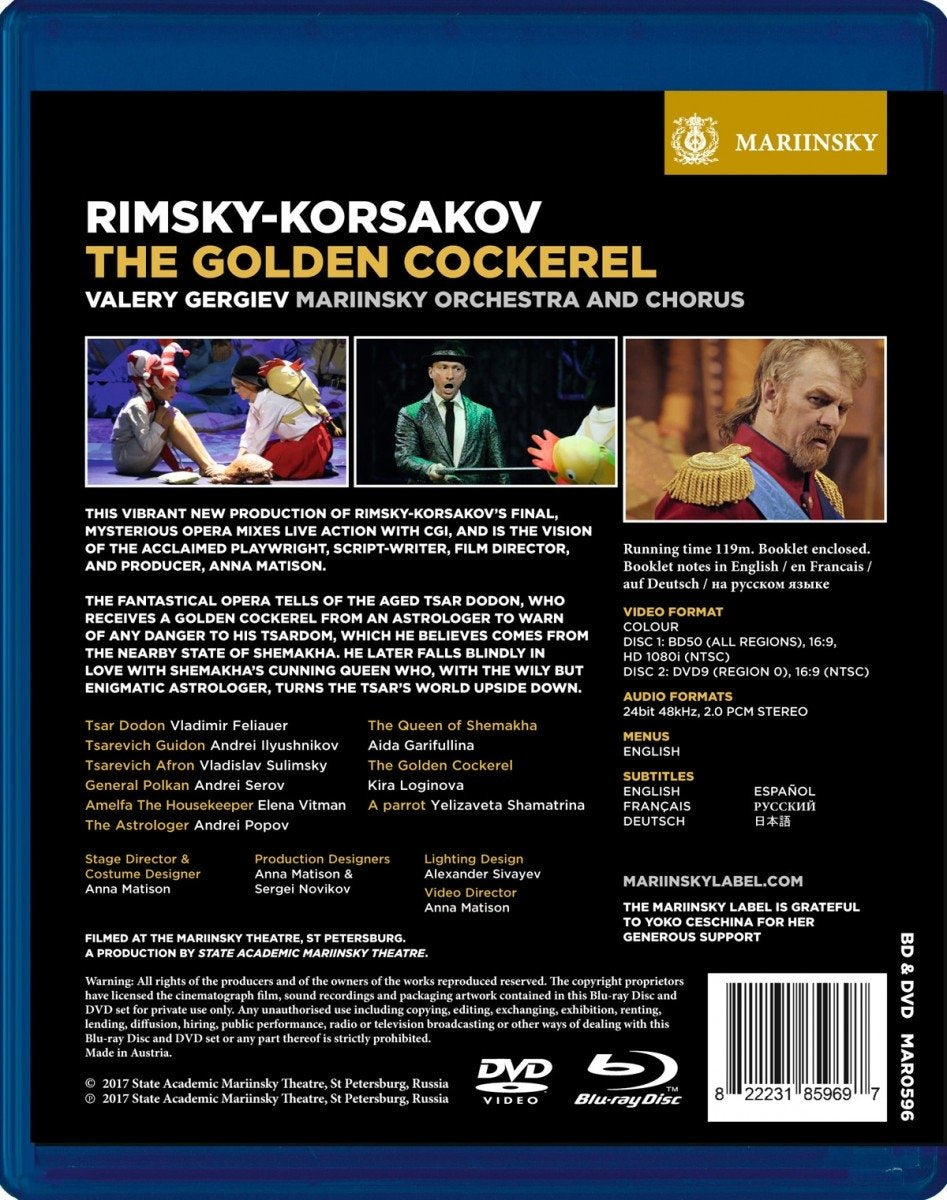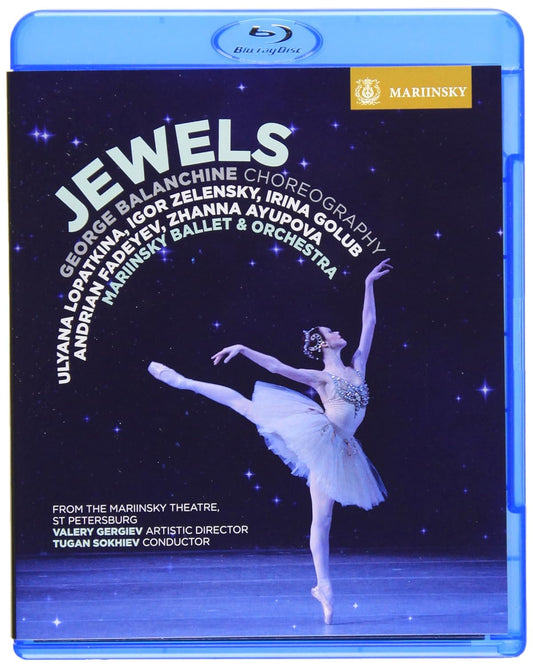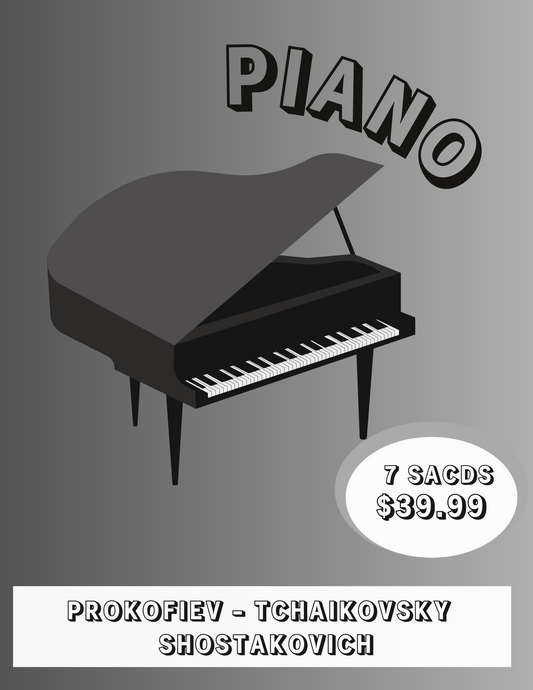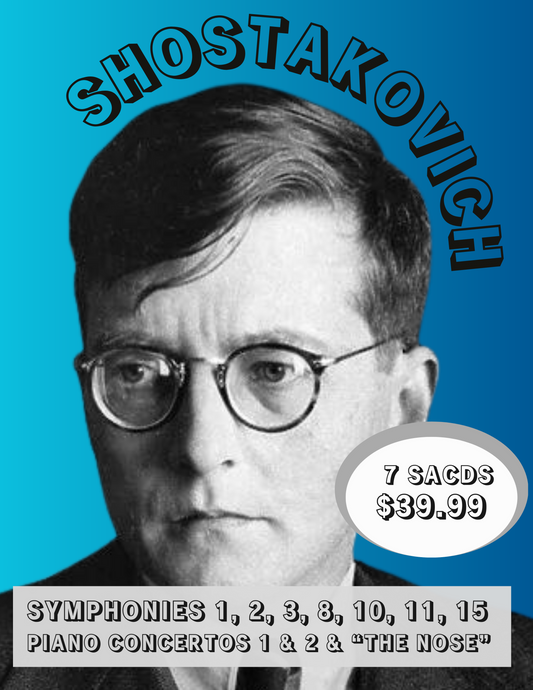
MARIINSKY
Rimsky-Korsakov: The Golden Cockerel (Le Coq d'Or) - VALERY GERGIEV, MARIINSKY ORCHESTRA & CHORUS (BluRay + DVD)
Rimsky-Korsakov: The Golden Cockerel (Le Coq d'Or) - VALERY GERGIEV, MARIINSKY ORCHESTRA & CHORUS (BluRay + DVD)
FORMAT (CD, LP, DVD?)
FORMAT (CD, LP, DVD?)
BLU-RAY
Couldn't load pickup availability
The "Double Play" package includes a Blu-Ray and a DVD.
Gergiev’s characteristically expansive conducting brings out Rimsky’s glowing Oriental languor…a fine cast [brings the characters] to life, notably Vladimir Feliauer’s gruffly vigorous Dodon, less fatuous than most, and Aida Garifullina’s Queen, not the usual creamy-voiced shintiyan-clad houri but a crystal-toned, leggy modern sex goddess.--BBC MUSIC MAGAZINE
Vladimir Feliauer (King Dodon), Andrei Popov (The Astrologer) & Aida Garifullina (Queen of Shemakha)
Mariinsky Orchestra & Chorus, Valery Gergiev
Following celebrated productions of Prokofiev Semyon Kotko and Shchedrin The Left-Hander, Valery Gergiev continues his survey of uniquely Russian works with The Golden Cockerel, Rimsky-Korsakov's final and, arguably, most mysterious opera. This vibrant new production mixes live action with CGI, and is the vision of Anna Matison, an acclaimed playwright, script-writer, film director and producer. The Golden Cockerel was Matison's directorial debut with the Mariinsky, and saw her also take on the roles of production and costume designer. ''In selecting the genre of the fairy-tale,'' the stage director says, ''I do not intend to experiment with it as a genre. It is a family story: for children it is a merry and vivid tale; for parents it is a wise parable.'' The melodious nature, beauty and leitmotifs of teh plot are underscored by the production designs; the opera uses pantomime and masquerades, while the set utilized 3D video projections. For much of the twentieth century, Rimsky-Korsakov's operatic works was largely ignored in the west, and he was better-known for his editing of major works by Mussorgsky. A thoroughly Russian composer, his music derived much from his country's rich legacy of folk tales, and hi slush, exotic orchestration was a strong influence on his student Stravinsky. Completed in 1907, just after the Russo-Japanese war, the opera's depiction of a witless Tsar meant it was initially banned and Rimsky-Korsakov never saw it performed. Finally staged in 1909, it received its first performance at the Mariinsky in 1919. Based on text by Alexander Pushkin, with libretto by Vladimir Belsky, the opera begins with The Astrologer, who introduces himself as the director of teh story, a moral tale, through a fantastical kingdom. King Dodon, once a great warrior, is now old and tired. However, his sons have not inherited his talent for warfare and his kingdom is now under threat. To aid the King, the Astrologer brings a cockerel, whose cries, he says, will warn of any attack. In gratitude, Dodon offers him one wish, which he decides to hold on to until later. soon after the cockerel crows, and Dodon sends his sons to battle. Following on behind them, he finds them slain and his army defeated. Dawn breaks and a despairing Dodon is greeted by a mysterious figure, the beautiful Queen of Shemakha. She seduces Dodon and they return to his kingdom, with her as his consort. Seizing this moment, the Astrologer decides that now is the time to use his wish, demanding Dodon hand over the Queen for himself. Furious, the King slays the Astrologer, but is then pecked to death by the Cockerel. Finally, the Queen and Cockerel both disappear, leaving behind chaos. Returning in an epilogue, the Astrologer finally explains that all the characters were imaginary, save for himself and the Queen.


MORE MARIINSKY LABEL TITLES ON SALE
-
Balanchine's Jewels - MARIINSKY BALLET AND ORCHESTRA (Blu-Ray)
Regular price €9,95 EURRegular priceUnit price / per -
Donizetti: Lucia Di Lammermoor - DESSAY / GERGIEV / MARIINSKY ORCHESTRA & CHORUS (2 HYBRID SACDS)
Regular price €11,95 EURRegular priceUnit price / per -
Massenet: Don Quichotte - VALERY GERGIEV, MARIINSKY ORCHESTRA (2 HYBRID SACDS)
Regular price €8,95 EURRegular priceUnit price / per -
Mussorgsky: Pictures At An Exhibition, Songs & Dances Of Death, Night On Bare Mountain - VALERY GERGIEV / MARIINSKY ORCHESTRA
Regular price €9,95 EURRegular priceUnit price / per -
PIANO BUNDLE - 7 SACDS
Regular price €37,95 EURRegular priceUnit price / per -
Prokofiev: Piano Concerto No. 3, Symphony No. 5 - DENIS MATSUEV / MARIINSKY ORCHESTRA / VALERY GERGIEV (Hybrid SACD)
Regular price €9,95 EURRegular priceUnit price / per -
Prokofiev: Semyon Kotko - VALERY GERGIEV, MARIINSKY ORCHESTRA (Blu-Ray+DVD)
Regular price €9,95 EURRegular priceUnit price / per -
Prokofiev: Symphonies Nos 4, 6 & 7; Piano Concertos Nos 4 & 5 - VALERY GERGIEV, ALEXEI VOLODIN, SERGEI BABAYAN, MARIINSKY ORCHESTRA (2 HYBRID SACDS)
Regular price €10,95 EURRegular priceUnit price / per -
Prokofiev: The Gambler - VALERY GERGIEV / MARIINSKY ORCHESTRA (BLU-RAY)
Regular price €9,95 EURRegular priceUnit price / per -
Prokofiev: The Gambler - VALERY GERGIEV / MARIINSKY ORCHESTRA (DVD)
Regular price €9,95 EURRegular priceUnit price / per -
Rachmaninov: Piano Concerto No 1; Shchedrin: Piano Concerto No 2; Stravinsky: Capriccio - DENIS MATSUEV / MARIINSKY ORCHESTRA / VALERY GERGIEV (HYBRID SACD)
Regular price €8,95 EURRegular priceUnit price / per -
Rachmaninov: Piano Concerto No. 2; Prokofiev: Piano Concerto No. 2 - DENIS MATSUEV, VALERY GERGIEV, MARIINSKY ORCHESTRA
Regular price €8,95 EURRegular priceUnit price / per -
Rachmaninov: Piano Concerto No. 3 & Rhapsody On A Theme Of Paganini - VALERY GERGIEV / MARIINSKY ORCHESTRA
Regular price €8,95 EURRegular priceUnit price / per -
Rimsky-Korsakov: The Golden Cockerel (Le Coq d'Or) - VALERY GERGIEV, MARIINSKY ORCHESTRA & CHORUS (BluRay + DVD)
Regular price €9,95 EURRegular priceUnit price / per -
Shchedrin: The Enchanted Wanderer (Le Voyageur Enchante) - VALERY GERGIEV / MARIINSKY CHORUS / MARIINSKY ORCHESTRA / SERGEI ALEKSASHKIN / EVGENY AKIMOV / KRISTINA KAPUSTINSKAYA (2 Hybrid SACDS)
Regular price €10,95 EURRegular priceUnit price / per -
Shchedrin: The Left-Hander - VALERY GERGIEV / MARIINSKY ORCHESTRA (2 HYBRID SACDS)
Regular price €11,95 EURRegular priceUnit price / per -
Shchedrin: The Left-Hander - VALERY GERGIEV, MARIINSKY ORCHESTRA (BluRay + DVD)
Regular price €9,95 EURRegular priceUnit price / per -
SHOSTAKOVICH BUNDLE - SYMPHONIES, PIANO CONCERTOS, "THE NOSE" (7 SACDS)
Regular price €37,95 EURRegular priceUnit price / per -
Shostakovich: Piano Concertos Nos. 1 & 2 - DENIS MATSUEV / VALERY GERGIEV / MARIINSKY ORCHESTRA (HYBRID SACD)
Regular price €9,95 EURRegular priceUnit price / per -
Shostakovich: Symphonies 1 & 15 - MARIINSKY ORCHESTRA & CHOIR, GERGIEV (Hybrid SACD)
Regular price €9,95 EURRegular priceUnit price / per






















